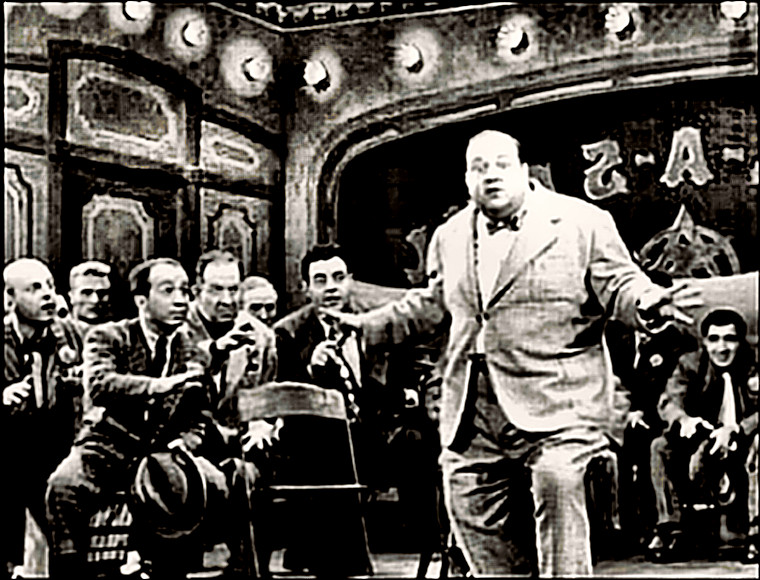Cy Old
Cy Feuer, one of Broadway's greatest producers of musicals, died a few years back. I just read his 2003 memoir, put out when he was in his 90s, I Got The Show Right Here.
The title, of course, refers to a number from his most beloved hit, Guys And Dolls. It's the first song in the show, "Fugue For Tinhorns." (He says the song is better known as "Can Do," and I question that. A friend wanted to play the song so I lent her my copy of the Frank Loesser songbook and she said it wasn't there. I ask her what did she think the title was and she replied "I Got The Horse Right Here.") One of his stories is about how the song made it in the show. It was a delightful number, but it's about the ponies, whereas the show is about craps. So they put it right up front before the story started and the audience never noticed.
Born in 1911, Feuer was a Jewish boy from Brooklyn who, as a teenager, had to be the man of the house when his dad died. Cy could play the horn and soon got work with jazz bands. He eventually went to Julliard and then later, on a tour, got to California and decided to stay. He had no prospects, but boundless energy and enthusiasm. Before too long he started working in films. He sent for his family and worked his way up to head of the music department at Republic Pictures.
Out in Hollywood he met plenty of other young Jewish men from New York, including some great songwriters--greater than he was--like Jule Styne and Frank Loesser. So he felt he'd gone as far as he could in his field and wanted to be the best at something. After a detour known as World War II, he met his partner, Ernest Martin, and together they started producing Broadway shows.
Their first was Where's Charley?, a 1948 adaptation of the warhorse farce Charley's Aunt. As a producer, Feuer wasn't just about getting the rights and raising the money. He also put his hand in creatively. In particular, he came up with the idea of combining two major characters in the play so the story was big enough to sing--which attracted George Abbott, who directed and wrote the book.
Cy's old acquaintance Frank Loesser was signed to write the lyrics, but when Harold Arlen dropped out, Loesser got his first shot at a complete score. The star was Ray Bolger (who collapsed from exhaustion during previews) and the show was not well reviewed. It looked like a flop but one night Bolger went up on his big act two song "Once In Love With Amy" and a kid in the audience (related to Feuer) helped him finish. Soon, Bolger would engage in a highly popular twenty minute singalong and the show ran for 792 performances.
Feuer and Martin, with their hands-on approach, started with a streak of hit shows--Guys And Dolls, Can-Can, The Boy Friend and Silk Stockings--and soon thought they could do no wrong. But as helpful as Cy was artistically, having people like Abbott, Loesser, George S. Kaufman, Abe Burrows and Cole Porter made a big difference. So when Cy in 1958 decided to produce, direct and write the book for Whoop-Up, he had his first flop.
The team convinced Loesser and Burrows to work together for the first time since Guys And Dolls, and won a Pulitzer Prize with How To Succeed In Business Without Really Trying (1961). It was Cy's last smash. He had a few minor hits and some flops after that, but his Broadway heyday was over. He also produced some movies, in particular, Cabaret (1972), directed by his How To Succeed choreographer Bob Fosse. They had a falling out (Fosse was intense, and so was Feuer), but the film won eight Oscars. Cy didn't love the Broadway version and decided to drop the subplot, create a new one, play up the bisexuality and only have numbers done as performances within the story itself. I'd always assumed Fosse made those decisions, though according to Cy he was just lucky to get work in movies after his film verison of Sweet Charity flopped.
It's a fun book showing the world from a different vantage point. We so often see things from the point of view of the writer, director or actor and wonder just what a producer does. Well, now we know.




0 Comments:
Post a Comment
<< Home